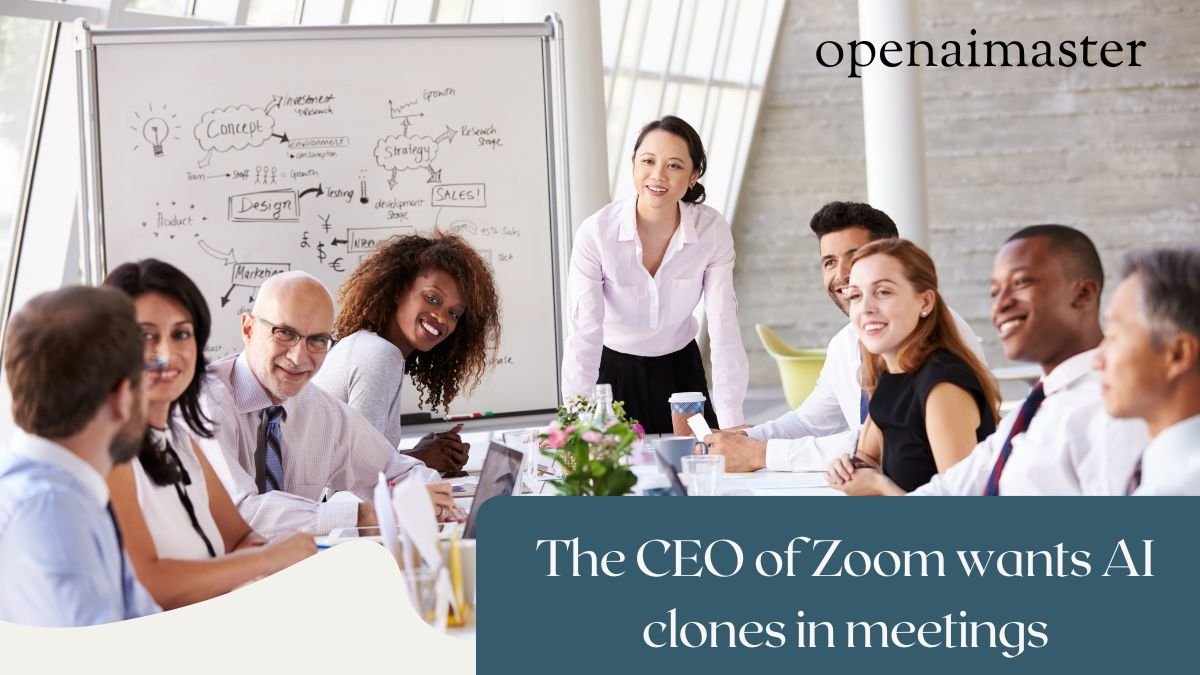If you find yourself dreading your never-ending schedule of Zoom calls and constantly sifting through emails, you’re not alone. Eric Yuan, the CEO of Zoom, feels your pain. He recently shared his vision for how artificial intelligence (AI) could completely overhaul our workdays and potentially lead to a 4-day workweek.
In an interview, Yuan painted a picture of a world where we all have a personalized “AI Clone” to handle mundane tasks like attending meetings, reading emails, making phone calls, and more. This would free us up to focus on more strategic and creative work, spend time with family, volunteer in our communities – essentially giving us back control of our schedules.
While it sounds almost too good to be true, Yuan believes the technology to make this a reality is coming soon. Zoom has already started investing heavily in generative AI capabilities. Let’s dive into the details of Yuan’s fascinating vision.
Your AI Twin: The Personal Assistant You’ve Always Dreamed Of
At the heart of Yuan’s plan is the idea of an “AI twin” – a digital replica of yourself powered by advanced AI that can step in and handle routine work on your behalf.
Imagine waking up and having your AI twin brief you: “Good morning! You have five meetings today, but I can handle four of them for you.” Your twin would then attend those meetings as your stand-in, taking notes and providing you with a summary afterwards.
The same applies to reading and responding to emails, making phone calls, managing projects, and countless other tasks that consume so much of our days. Your AI twin becomes your always-on personal assistant, giving you back precious time and flexibility.
Yuan even envisions a future where these AI twins become photorealistic 3D avatars that are indistinguishable from the real you. You may have multiple twins specializing in different roles – one as a sales pro, another as an engineer, and so on.
The AI Workplace Revolution
But Yuan’s ambitions go far beyond just AI assistants. He sees Zoom becoming an “AI Workplace” platform that seamlessly integrates AI across all workplace collaboration activities:
- Zoom meetings with AI-powered transcriptions, summaries, anddigests
- AI-generated responses to chats and emails
- AI coding assistants to streamline development work
- AI whiteboards to capture ideas and enhance brainstorming sessions
- AI task managers to automate project tracking
The possibilities are endless. By offloading repetitive “grunt work” to AI, Yuan believes knowledge workers could see up to 90% of their workload automated. This would give us unprecedented time back to focus on higher-level strategy, creativity, and meaningful human interactions.
A 4-Day Workweek Future?
One of the most tantalizing parts of Yuan’s vision is the prospect of a 4-day workweek becoming the norm, thanks to AI handling so much of our workload. After all, if we can accomplish in 1-2 days what currently takes 5 days, why not?
Yuan frames this as an opportunity to reset priorities: “Why not spend more time with your family? Why not focus on some more creative things, giving you back your time, giving back to the community and society to help others?”
Of course, the CEO acknowledges this AI-powered workplace is still years away. Two key hurdles are developing AI models advanced enough to truly understand context and be “personal” assistants, as well as customizing these systems for each individual based on their data, communication patterns, and work habits.
But Yuan is confident these barriers can be overcome soon, perhaps in the next 5-6 years. Zoom is already experimenting with AI-driven meeting tools like auto-summarization.
The Human Element Remains
Despite his enthusiasm for AI automating vast amounts of work, Yuan insists there is still huge value in human-to-human interaction, at least for important meetings, negotiations, and bonding. As he puts it:
“We still need to have in-person interaction. Say you and I are sitting together in a local Starbucks having an intimate conversation – AI cannot do that.”
His proposed solution is a “hybrid” model where AI handles the bulk of our day-to-day logistics and tasks, while we use our newly freed-up time to nurture key relationships through occasional in-person collaboration sessions, team-building events, or social activities.
For new employees, Yuan even suggests initially working in-office to build those critical human connections before then working more remotely and relying on their AI twin.
Is the World Ready?
Yuan’s AI workplace vision is ambitious to put it mildly. It represents a radical rethinking of how we spend our working hours and balance professional duties with personal lives.
There are certainly plenty of reasons to be skeptical. Developing AI sophisticated enough to be a true “twin” could be technologically daunting. There are also complex ethical questions around letting AI make decisions and represent us. Not to mention overhauling workplace norms and culture.
However, if any company is positioned to drive such transformative change, it’s Zoom. The video platform enabled the sudden shift to remote work during the pandemic. Perhaps Zoom’s next act will be empowering us to further blur the boundaries between our professional and personal lives.
One thing is clear: whether it’s 5 years or 10 years away, AI tsunami is headed for the workplace. Yuan’s “AI twin” concept is simply one of the most ambitious and intriguing visions yet for what that could look like. The future of work is coming – the question is whether you’ll be ready to embrace your AI clone.

